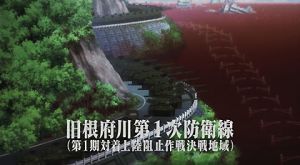Resources:Explanation of Evangelion 1.01

Explanation of Evangelion 1.01 is a version of Evangelion 1.0: You Are (Not) Alone included on the second disc bundled with the "special edition" 1.01 DVD release. It is identical to the regular movie included on the first disc, except that it has large titles (virtually all in Japanese) displayed throughout to provide "official designations" for people, locations, weapons, technology, and so forth. (This is similar to the technique used in Episode 06 of the original series.) A complete translation is provided here.
Translation & Notes: Reichu
General Notes
- A decent number of the terms are rendered in English within the film itself and the companion book Evangelion 1.0 Complete Records Collection, and these have been utilized heavily (albeit not with perfect consistency) in my translation. When there is a “significant” difference between these English renditions and what the Japanese literally says, I provide a literal translation as a footnote for your amusement.
- I use “ibid” (short for ibidum) in the literal Latin sense, i.e., “in the aforementioned place”. The original Japanese is 同 (dou, “the same”), used here to avoid repetition in many of the back-to-back entries regarding locations, although this does mean you have to deduce how much of the aforementioned place is actually the “same”. Hopefully shouldn't be a problem, though.
- Since many Japanese proper names have kanji that can be read multiple ways, I attempted, to the best of my ability, to find out the correct pronunciations of the specific places mentioned. For example, entry 178 has a city called 湯沢 in Akita Prefecture, which can be read either Yuzawa or Yusawa — so this basically means determining which of the two actually exists in Akita. (It's Yuzawa). “Clever Googling” didn't work for me in all instances, though, which I'll be noting.
- Place names are left intact aside from translating 旧 (kyuu) into “Old” and 新 (shin) into “New”. FYI: -ko is “lake”, -yama or -zan is “mountain”, -take is “pass”, and -dani is “valley”.
